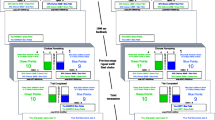Abstract
Several studies of choice behavior (risk taking) in achievement-oriented situations are reanalyzed. The usual ways of pooling all choices over trials and subjects conceal the series of subjects' decisions and the dynamics inherent in these decisions. A basic strategy of subjects in an achievement-oriented choice situation seems to be to start with an easy task, choose a more difficult one whenever you succeed, and stay mostly at the same difficulty level whenever you fail. A computer model, in which such simple assumptions are made, generates preference functions over the order of difficulty levels that are indistinguishable from those found in empirical studies. It is concluded that the study of choice behavior in achievement-oriented situations should be based on the analysis of the series of single decisions by one subject. For this we need models that allow the predictions of such decisions and the prediction of action-controlling cognitions and emotions.
Similar content being viewed by others
References
Atkinson, J. W. Motivational determinants of risk taking behavior.Psychological Review 1957,64 359–372.
Atkinson, J. W., & Birch, D.The dynamics of action. New York: Wiley, 1970.
Atkinson, J. W., & Birch, D. The dynamics of achievement-oriented activity. In J. W. Atkinson & J. O. Raynor (Eds.),Motivation and achievement. Washington, D.C.: Hemisphere, 1974.
Atkinson, J. W., & Feather, N. T. (Eds.).A theory of achievement motivation. New York: Wiley, 1966.
Atkinson, J. W., & Raynor, J. O. (Eds.).Motivation and achievement. Washington, D.C.: Hemisphere, 1974.
Escalona, S. K. The effect of success and failure upon the level of aspiration and behavior in manic-depressive psychoses.University of Iowa Studies in Child Welfare 1940,16 199–302.
Festinger, L. A theoretical interpretation of shifts in level of aspiration.Psychological Review 1942,49 235–250.
Heckhausen, H. Achievement motive research: Current problems and some contributions toward general theory of motivation. In W. J. Arnold (Ed.),Nebraska symposium on motivation 1968. Lincoln: University of Nebraska Press, 1968.
Heckhausen, H., & Wagner, I. Anfänge und Entwicklung in der Leistungsmotivation: (II) In der Zielsetzung des Kleinkindes.Psychologische Forschung 1965,28 179–245.
Jopt, U.Extrinsische Motivation und Leistungsverhalten. Unpublished doctoral dissertation, Ruhr-Universität Bochum, 1974.
Kuhl, J., & Blankenship, V. The dynamic theory of achievement motivation: From episodic to dynamic thinking.Psychological Review 1979,86 141–151. (a)
Kuhl, J., & Blankenship, V. Behavioral change in a constant environment: Shift to more difficult tasks with constant probability of success.Journal of Personality and Social Psychology 1979,37 551–563. (b)
Lewin, K., Dembo, T., Festinger, L., & Sears, P. S. Level of aspiration. In J. McV. Hunt (Ed.):Personality and the behavior disorders (Vol. 1). New York: Ronald, 1944.
Mayer, W.-U.Leistungsmotiv und Ursachenerklärung von Erfolg und Misserfolg.Stuttgart Klett, 1973.
Raynor, J. O. Future orientation, self-evaluation, and achievement motivation: Use of an expectancy X value theory of personality functioning and change. In N. T. Feather (Ed.),Expectations and actions. Hillsdale, New Jersey: Erlbaum, 1982.
Rotter, J. B. Level of aspiration as a method of studying personality: IV. The analysis of response.Journal of Social Psychology 1945,21 159–177.
Schneider, K.Motivation unter Erfolgsrisiko. Gottingen: Hogrefe, 1973.
Schneider, K. Subjektive Unsicherheit und Aufgabenwahl.Archiv für Psychologie 1974,126 147–169.
Schneider, K., & Heckhausen, H. Subjective uncertainty and task preference. In H. I. Day (Ed.),Advances in intrinsic motivation and aesthetics. New York: Plenum, 1981.
Schneider, K., & Posse, N. Subjektive Unsicherheit, Kausalattribuierungen und Aufgabenwahl I.Zeitschrift für Experimentelle und Angewandte Psychologie 1978,25 302–320. (a)
Schneider, K., & Posse, N. Subjektive Unsicherheit, Kausalattribuierungen und Aufgabenwahl II.Zeitschrift für Experimentelle und Angewandte Psychologie 1978,25 474–499. (b)
Schneider, K., & Posse, N. Der Einfluss der Erfahrung mit einer Aufgabe auf die Aufgabenwahl, Subjektive Unsicherheit und die Kausalerklärungen für Erfolge.Psychologische Beiträge 1978,20 228–250. (c)
Simon, H. A. A behavioral model of rational choice.Quarterly Journal of Economics 1955,69 99–118.
Trope, Y. Seeking information about one's own ability as a determinant of choice among tasks.Journal of Personality and Social Psychology 1975,32 1004–1013.
Trope, Y., & Brickman, P. Difficulty and diagnosticity as determinants of choice among tasks.Journal of Personality and Social Psychology 1975,31 918–926.
Wagner, I.Das Zielsetzungsverhalten von vier ausgewählten Gruppen normaler Kleinkinder in Einzel- und Gruppensituationen. Unpublished doctoral dissertation, Ruhr-Universität Bochum, 1969.
Wasna, M.Die Entwicklung der Leistungsmotivation. Munich: Reinhardt, 1970.
Weiner, B., Frieze, I., Kukla, A., Reed, L., Rest, S., & Rosenbaum, R. M.Perceiving the causes of success and failure. New York: General Learning Press, 1971.
Author information
Authors and Affiliations
Additional information
This is part of a paper presented in a symposium, Attributional Approaches to Human Motivation, W.-U. Meyer & B. Weiner, Center for Interdisciplinary Research, University of Bielefeld, W. Germany, July 1980. Many thanks to Dr. J. Nicholls, Purdue University, and to two anonymous reviewers for helpful comments on earlier drafts of this manuscript.
Rights and permissions
About this article
Cite this article
Schneider, K., Posse, N. Risk taking in achievement-oriented situations: Do people really maximize affect or competence information?. Motiv Emot 6, 259–271 (1982). https://doi.org/10.1007/BF00992248
Issue Date:
DOI: https://doi.org/10.1007/BF00992248




